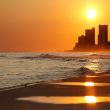Film Works at the Department of Energy
The James Forrestal building in Washington, D.C., houses the governing authority on energy efficiency, the U.S. Department of Energy (DOE). As an organization that researches and determines energy conservation practices, the DOE needs a facility that is as energy efficient as possible. Additionally, as a government agency, building safety is a constant concern and top priority, and the highest measures of protection are required for the agency’s employees.
To both improve the energy efficiency and overall safety, the DOE was faced with two choices — either install a safety and solar window film on the existing windows, or replace the existing windows with laminated panes of glass.
Major obstacles stood in the way of installing new windows. First, the cost was estimated as being three to four times higher than the cost of the window film. Also, the dimensions of the laminated glass windows were not equal to the existing window frame dimensions; thus, if the new windows were installed, an architect would need to be consulted and new designs for each installation space would have to be developed. And finally, the installation of window film would help the DOE achieve its desired results more quickly, requiring only a matter of weeks for the completion of window film installation, rather than months for the replacement of its windows.
These obstacles made the decision an easy one. The DOE contracted independent safety film dealer Wayne Staley of Mid-Atlantic Commercial Window Shield to install solar safety film to each of the nearly 4,000 panes of glass in the building. Staley used more than 80,000 square feet of Armorcoat 8 mil Stainless Steel 35 for the job.
The solar control properties of the window film prevent 50 percent of total solar energy and 98 percent of ultraviolet light from coming into the building through the windows. The film keeps building temperatures down in hot weather and reduces energy needs. It also insulates the windows, thus reducing energy loss during winter months. The film also offers protection from glass-related injuries, since it would hold broken glass in place during severe weather, a bomb blast or other such events.
Armorcoat films, provided by Bekaert Specialty Films, LLC, Clearwater, Fla., range in thickness from 2-14 mils, providing varying degrees of anti-penetration resistance. Thicker than standard window film, Armorcoat makes glass stronger and more resistant to breakage thanks to strong, optical-quality polyester, high-grade ultraviolet inhibitors, and special laminating and mounting adhesives.
Once installed to the inside the surface of glass, the special mounting adhesive forms a molecular bond, thus strengthening the overall integrity of the pane.




















